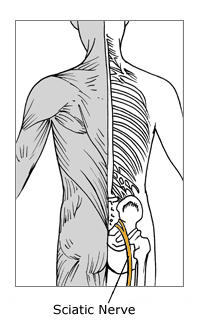Sciatica is a medical term used to describe the symptoms caused by a low back condition. That means that your sciatica could be caused by a bulging disc or a herniated disc, degenerative disc disease, piriformis syndrome, pregnancy, spinal stenosis, a spinal tumor or spinal infection, spondylolisthesis, or trauma.
Any one of those conditions can put pressure on the sciatic nerve or related nerve roots in your low back. And that pressure is what causes your pain and other symptoms. Your doctor may also call sciatica a radiculopathy, which is a medical term used to describe pain, numbness, tingling, and weakness in the arms or legs. Since sciatica originates in your low back—the lumbar spine—it is called a lumbar radiculopathy.

Symptoms of sciatica
To get the best treatment for sciatica, it’s important to recognize and understand the symptoms. You can feel sciatica in different ways, including:
- Pain that travels from the low back, through the buttocks, downward into the leg
- Shooting pain down your leg—sometimes described as like electricity.
- Burning and tingling sensations in your leg.
- Partial leg numbness or weakness.
- Pain, burning, tingling, numbness, or weakness on only one side of your lower body.
- Pain and other symptoms may be constant and vary from mild to severe.
- Sitting, trying to stand up, and walking may be painful and difficult.
- Coughing, sneezing, and other sudden movements can intensify pain.
You must treat your back pain properly. Seek medical attention if your pain persists—and seek immediate attention if you have any of the following emergency signs:
- Pain is getting worse.
- Pain affects your every day activities.
- Leg weakness or numbness.
- Loss of bowel or bladder control.
You can experience sciatica in different ways and in different parts of your leg—it all depends on where your sciatic nerve is affected in your low back. When you’re describing your symptoms to your doctor, it’s helpful to be as exact as possible. This will help him or her more accurately diagnose the cause.